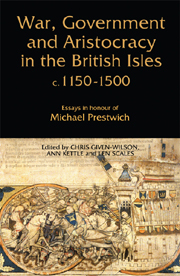 War, Government and Aristocracy in the British Isles, c.1150–1500
War, Government and Aristocracy in the British Isles, c.1150–1500 Book contents
- Frontmatter
- Contents
- List of Contributors
- Introduction
- Abbreviations
- Did Henry II Have a Policy Towards the Earls?
- The Career of Godfrey of Crowcombe: Household Knight of King John and Steward of King Henry III
- Under-Sheriffs, The State and Local Society c.1300–1340: A Preliminary Survey
- Revisiting Norham, May–June 1291
- Treason, Feud and the Growth of State Violence: Edward I and the ‘War of the Earl of Carrick’, 1306–7
- The Commendatio Lamentabilis for Edward I and Plantagenet Kingship
- Historians, Aristocrats and Plantagenet Ireland, 1200–1360
- War and Peace: A Knight's Tale. The Ethics of War in Sir Thomas Gray's Scalacronica
- The King's Secrets: Richard de Bury and the Monarchy of Edward III
- Budgeting at the Medieval Exchequer
- Recent Scholarship on Crusading and Medieval Warfare, 1095–1291: Convergence and Divergence
- The Military Ordinances of Henry V: Texts and Contexts
- Chivalry and English Kingship in the Later Middle Ages
- Cloth of Gold and Gold Thread: Luxury Imports to England in the Fourteenth Century
- Bibliography of the Writings of Michael Prestwich
- Index
- Tabula Gratulatoriad
War and Peace: A Knight's Tale. The Ethics of War in Sir Thomas Gray's Scalacronica
Published online by Cambridge University Press: 12 September 2012
- Frontmatter
- Contents
- List of Contributors
- Introduction
- Abbreviations
- Did Henry II Have a Policy Towards the Earls?
- The Career of Godfrey of Crowcombe: Household Knight of King John and Steward of King Henry III
- Under-Sheriffs, The State and Local Society c.1300–1340: A Preliminary Survey
- Revisiting Norham, May–June 1291
- Treason, Feud and the Growth of State Violence: Edward I and the ‘War of the Earl of Carrick’, 1306–7
- The Commendatio Lamentabilis for Edward I and Plantagenet Kingship
- Historians, Aristocrats and Plantagenet Ireland, 1200–1360
- War and Peace: A Knight's Tale. The Ethics of War in Sir Thomas Gray's Scalacronica
- The King's Secrets: Richard de Bury and the Monarchy of Edward III
- Budgeting at the Medieval Exchequer
- Recent Scholarship on Crusading and Medieval Warfare, 1095–1291: Convergence and Divergence
- The Military Ordinances of Henry V: Texts and Contexts
- Chivalry and English Kingship in the Later Middle Ages
- Cloth of Gold and Gold Thread: Luxury Imports to England in the Fourteenth Century
- Bibliography of the Writings of Michael Prestwich
- Index
- Tabula Gratulatoriad
Summary
One day in mid-October 1355, a Scottish raiding party, laden with booty, crossed the River Tweed back into Scotland at the ford at Norham in North-umberland. The constable of Norham castle, Sir Thomas Gray, quickly mustered his garrison and set off in hot pursuit of the raiders. Unfortunately, it was a trap, and a few miles into Scotland Gray and his men were ambushed by a much stronger Scottish force. After a fierce struggle, Gray was captured, and hauled off to imprisonment in Edinburgh castle. To while away the long hours of his captivity, he decided to write a book of ‘the chronicles of Great Britain, and the deeds of the English’. The result of his endeavours was the Scalacronica; and given that we owe its very existence to war, it is not perhaps altogether surprising that the subject of war has a prominent place in the work.
As the circumstances which led to the writing of the Scalacronica suggest, Gray was an active knight who spent his adult life in military service. This was mainly against the Scots, though he served on Edward III's somewhat lacklustre campaign in Flanders in 1338–9, and on his rather more impressive French campaign of 1359–60. These, and other campaigns, are described in some considerable detail in Gray's work. Unfortunately, however, the sole surviving manuscript of the Scalacronica lacks a quire covering the period 1340 to 1355.
- Type
- Chapter
- Information
- War, Government and Aristocracy in the British Isles, c.1150–1500Essays in Honour of Michael Prestwich, pp. 148 - 162Publisher: Boydell & BrewerPrint publication year: 2008


